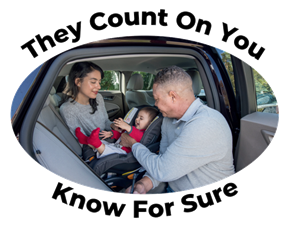
September 15 – 21, 2024
Keeping children safe while traveling is a top priority for parents and caregivers, and most believe that they know how to properly install and use their child’s car seat. Sadly, motor vehicle crashes are still a leading cause of death for children and national data indicates that 46% of car seats are misused. One of the most common mistakes parents and caregivers make is moving a child to the next car seat before the child is ready and has outgrown their current car seat. Children are best protected during vehicle travel when they are secured in a correctly installed car seat that is appropriate for their age and size.
Planning an Event for Child Passenger Safety Week?

Click here for the Child Passenger Safety Week planner and more information.

Child Passenger Safety Week (CPS Week) focuses attention on the need to secure children as safely as possible. The Pennsylvania 2024 theme, “Love Me, Buckle Me…. Every Trip, Every Time, Every Vehicle” highlights the importance of choosing an appropriate car seat for every child and using it correctly every time. The car seat check events scheduled throughout the week provide hands-on guidance to caregivers on the correct selection, installation and use of an appropriate car seat, booster seat, or seat belt based on the child’s age, weight, height, and developmental needs.

Most parents think they are using their car seats correctly to protect their children and keep them safe. Child Passenger Safety Week is the time to check that children are as safe as possible when they are riding in a vehicle.
- Recommendations are based on decades of research that have shown the safest way for children to ride in vehicles.
- Keep children rear-facing as long as possible, up to the top height and weight allowed by their particular seats.
- Once a child outgrows a rear-facing car seat, the child is ready to travel in a forward-facing car seat with a harness and tether. The tether is 100% essential for installing a forward-facing car seat; it keeps the seat from moving forward in a crash.
- After a child outgrows the forward-facing car seat, the child should be buckled in a booster seat until the adult seat belt fits the child properly.
- A children might ask to use the seat belt instead of a booster seat because it makes them feel older to ride without it, but the truth is: their safety is what matters most.
- Once your child is ready to use a seat belt, ensure that it fits correctly, and remember that the safest place for all kids under 13 is buckled up in the back seat.
Pennsylvania’s Occupant Protection Law for Children
- All children from birth to age 4 must be secured in a car seat anywhere in the vehicle.
- Children younger than age 2 must be secured rear-facing, until they outgrow the maximum weight and height of the car seat.
- All children 4 years of age and older, but less than 8 years, must be secured in a seat belt and an appropriate booster seat anywhere in the vehicle.
- All children 8 years of age and older, but less than 18 years of age, must be secured in a seat belt system anywhere in the vehicle.
- All drivers are responsible for securing children in the appropriate car seat, booster seat, or seat belt.
Child Passenger Safety Week, is a time for parents to make sure children are in the right car seat and that it is being used correctly—every trip, every time, every vehicle. The single most effective way to protect children, and all vehicle occupants, is to correctly buckle all passengers in a car seat, booster seat, or seat belt that is appropriate for their age and size. Child Passenger Safety Week is a time when parents can attend one of the car seat check events, scheduled throughout the State, to be certain children are as safe as possible when they are riding in a vehicle. Car seat check events provide hands-on guidance on the correct selection, installation and use of the appropriate car seat, booster seat, or seat belt based on a child’s age, weight, height, and developmental needs.
For more information about the correct selection, installation, and use of a car seat or to request materials visit www.pakidstravelsafe.org or call 1-800 CAR BELT.
